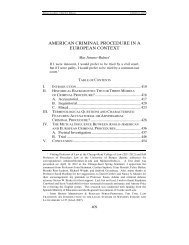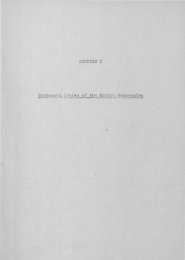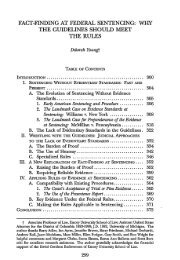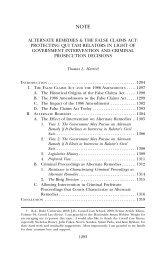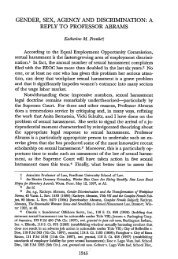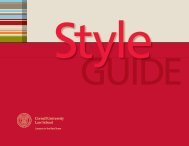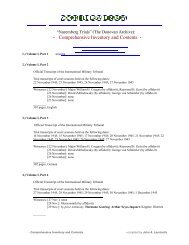JUDICIAL CLERKSHIP HANDBOOK - Cornell University Law School
JUDICIAL CLERKSHIP HANDBOOK - Cornell University Law School
JUDICIAL CLERKSHIP HANDBOOK - Cornell University Law School
Create successful ePaper yourself
Turn your PDF publications into a flip-book with our unique Google optimized e-Paper software.
Grades and Other Credentials<br />
You do not have to be at the top of your class to obtain a clerkship. History has shown<br />
that <strong>Cornell</strong> <strong>Law</strong> <strong>School</strong> graduates in every quartile of the class have obtained federal<br />
and state court clerkships. You do have to be realistic about your chances, however.<br />
You need to assess your credentials, think about your geographic location, and the<br />
likely level of competition for the clerkships you desire. Note that some judges have<br />
very individualistic criteria, such as a preference for clerks who went to their alma<br />
matter or who will remain to practice in the community. The Clerkship Application<br />
Worksheet, Appendix A, will help identify characteristics that distinguish you from<br />
other applicants, and CONNECT might help you focus on (or eliminate) certain judges.<br />
Judicial Internships<br />
Many judges are willing to have law students volunteer in their chambers during<br />
summers or the school year, to gain experience in how a chambers works, and to assist<br />
the judge and her clerks with their work. These positions are usually referred to as<br />
judicial internships (or externships.) At <strong>Cornell</strong>, students usually take advantage of this<br />
opportunity during the summer following the first year of law school, either as a<br />
volunteer internship or through the summer Externship course. Opportunities for<br />
second summer and term time judicial externships also exist.<br />
Judges seeking law clerks generally view the experience you may have gained as a<br />
judicial intern as very valuable. Students who have been judicial interns have the<br />
benefit of being Aup the curve@ on a judge=s expectations and on the role of a law clerk.<br />
Judicial interns typically are able to develop their legal research and writing skills, and<br />
may wind up with a solid writing sample. In addition, a judicial internship may allow a<br />
student to develop a strong relationship with a judge, who may be willing to act as a<br />
reference or provide recommendations for your judicial clerkship search, in addition to<br />
being a valuable mentor.<br />
Some judges have a policy of not accepting clerkship applications from students who<br />
have been judicial interns in their chambers. However, others have been known to<br />
solicit applications from students who interned for them in the past. If you have had<br />
the experience of being a judicial intern, contact the judge or clerks with whom you<br />
worked to find out how your experience as an intern can best be presented in your<br />
search for a judicial clerkship.<br />
FINANCIAL ISSUES<br />
Certainly financial considerations may limit the number of interviews you are able to accept<br />
in distant locations as judges do not have money available to fly candidates in. On the<br />
financial side, however, consider the fact that, while a federal law clerk=s salary does not<br />
approach the level of a large law firm in a large city, federal law clerk salaries are quite<br />
respectable. Federal law clerks across the country make generally the same salary (which<br />
11 | P age




